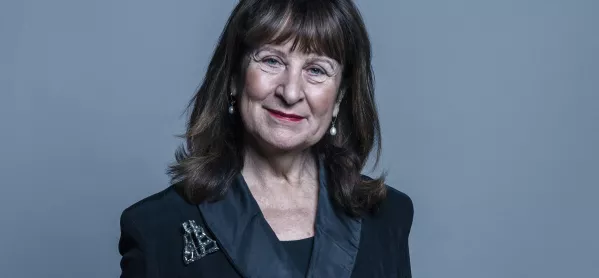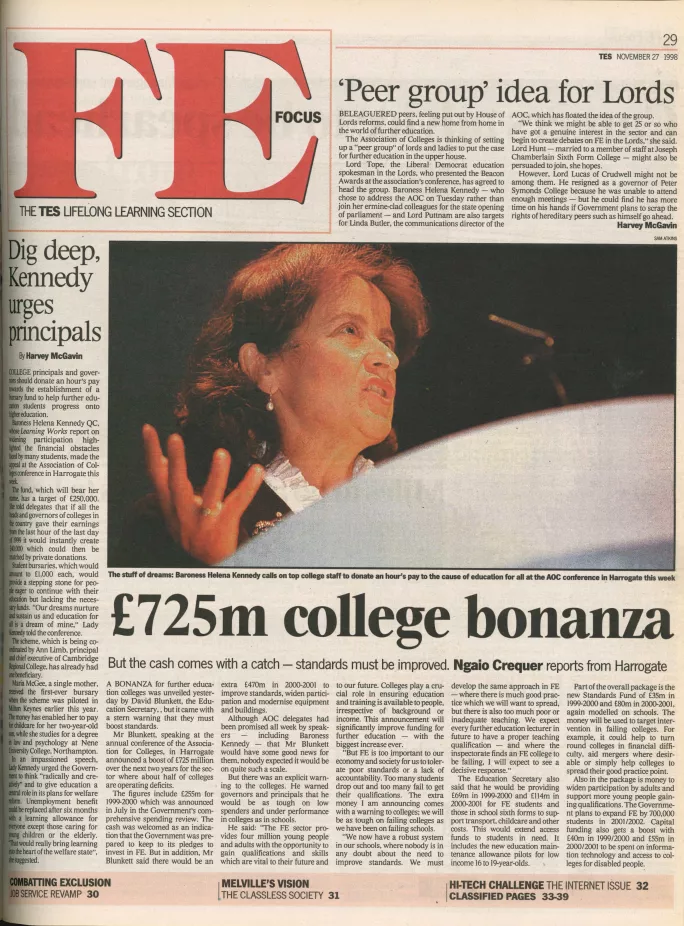
- Home
- ‘Why the Helena Kennedy Foundation still matters’
‘Why the Helena Kennedy Foundation still matters’

It was on a train journey in June 1997 that the that the germ of an idea entered my head. I had just attended the launch of the report Learning Works: widening participation in FE, written by Helena Kennedy (pictured), in London and was returning to Cambridge Regional College, where I was principal at the time.
Twenty years later, the independent educational and social justice charity, the Helena Kennedy Foundation (HKF), thrives and continues to grow. To date we have, through the provision of bursaries, mentoring and ongoing help, supported over 1,500 disadvantaged students from adult and further education to progress to higher education and into employment.
This is a brief look back at what led to the setting up of the charity – still unique in the further education sector. It’s also a reminder of the enduring power of adult and further education to achieve incalculable social transformation for individuals, colleges, communities, the economy and society as a whole.
As David Hughes, chief executive of the Association of Colleges, recently noted in a Tes blog, the role of FE to give a “second chance” is as much needed now as it was in the heady days of New Labour.
'Incensed and galvanised into action'
Back then David Blunkett was the education secretary and there was a palpable feeling of optimism about the future of post-16 education and skills. We thought we were at the dawn of the future outlined in the Learning Age Green Paper.
In reality, it didn’t feel like that when FE college budgets were, once again, restricted by a combination of Tony Blair’s prioritisation of funding for schools and Gordon Brown’s insistence on overall fiscal prudence.
For me, one of the most powerful phrases in Learning Works was Helena Kennedy’s observation that: “If at first you don’t succeed: you don’t succeed."
So when the New Labour government failed to take forward the recommendations of Learning Works, and instead proposed a target of 50 per cent participation in higher education while simultaneously introducing tuition fees of £1,000 – payable upfront – I was both incensed and galvanised into action.
'A door slammed shut in their faces'
This was unfair. It was narrowing participation, not widening it, and such a policy would potentially hold back a generation of FE students from achieving their goals.
Significant numbers of FE students, many of whom Helena had met personally as part of her research for Learning Works, had already made huge personal sacrifices and overcome significant barriers to get on to, or return to, the ladder of learning.
They would find it impossible to pay £1,000 simply in order to get into university. A door had been slammed shut in their faces.
Once again, despite Tony Blair’s mantra of “education, education, education”, further education was indeed further and further from the policy objectives and funding pots of New Labour.

'Humanity’s capacity for goodness'
I wrote to Baroness Kennedy, who had by then been made a Labour peer, expressing my outrage at the government’s treatment of FE and sharing with her my idea of founding an independent educational charity, to be named after her, to take forward the recommendations of her report Learning Works.
She agreed to meet me. This was the first time I had ever been to the House of Lords. I sat with her in the tea room, in awe and trepidation, explaining that I wanted to set up a scheme to award bursaries of £1,000 to students from the sector to enable them to access HE.
I assured her that I would never ask her for any money, I would safeguard her reputation at all costs, and I would do all the work – with a little help from a few friends in FE. So, the Helena Kennedy Bursary Scheme, now the Helena Kennedy Foundation, was launched at the Association of Colleges' annual conference in November 1998.
The gifts Helena Kennedy gave – her name and identity combined with her confidence in me, then a complete stranger – lie at the core of the charity’s values of trust, kindness, belief in humanity’s capacity for goodness, and determination to do the right thing when an injustice is experienced.
These values suffuse the operational activities of Helena Kennedy Foundation, whose beneficiaries are never asked to pay back the money that is given to them, nor are they asked to account for how it is spent – because it is a gift, and a gift that in itself demonstrably generates more giving.
Now, 20 years on, validation of this approach is there for all to witness in the success of the students who have gone through Helena Kennedy Foundation.
Their voices and their stories are vividly captured in the charity’s 20th anniversary impact report Learning Worked, which is being published to coincide with Helena’s return to speak at the AoC conference and can be downloaded from the charity’s website.
'Acts of kindness change our world'
Now is also the time to look forward and introduce the Helena Kennedy Foundation to a new generation in FE who do not know about the origins of the charity, its achievements and its continuing work – and it is a chance for more colleges, training providers, universities and sponsors to participate in the foundation. I hope the coverage that our anniversary brings will encourage this.
Finally, I hold to the belief that impelled me from the outset – that small-scale, sometimes random, often utterly idealistic, philanthropic acts of kindness change our world.
So many Helena Kennedy Foundation students, who have benefited from a small gift rendered at a time of great need when everything else seemed dark and impossible, have transformed their lives and the lives of those around them, just because someone else believed in them and their dreams.
Dr Ann Limb is the founder and vice-president of the Helena Kennedy Foundation. Tes is media partner for the AoC Annual Conference, which takes place on 20-21 November at the ICC, Birmingham
Register with Tes and you can read five free articles every month, plus you'll have access to our range of award-winning newsletters.
Keep reading for just £4.90 per month
You've reached your limit of free articles this month. Subscribe for £4.90 per month for three months and get:
- Unlimited access to all Tes magazine content
- Exclusive subscriber-only stories
- Award-winning email newsletters
You've reached your limit of free articles this month. Subscribe for £4.90 per month for three months and get:
- Unlimited access to all Tes magazine content
- Exclusive subscriber-only stories
- Award-winning email newsletters
